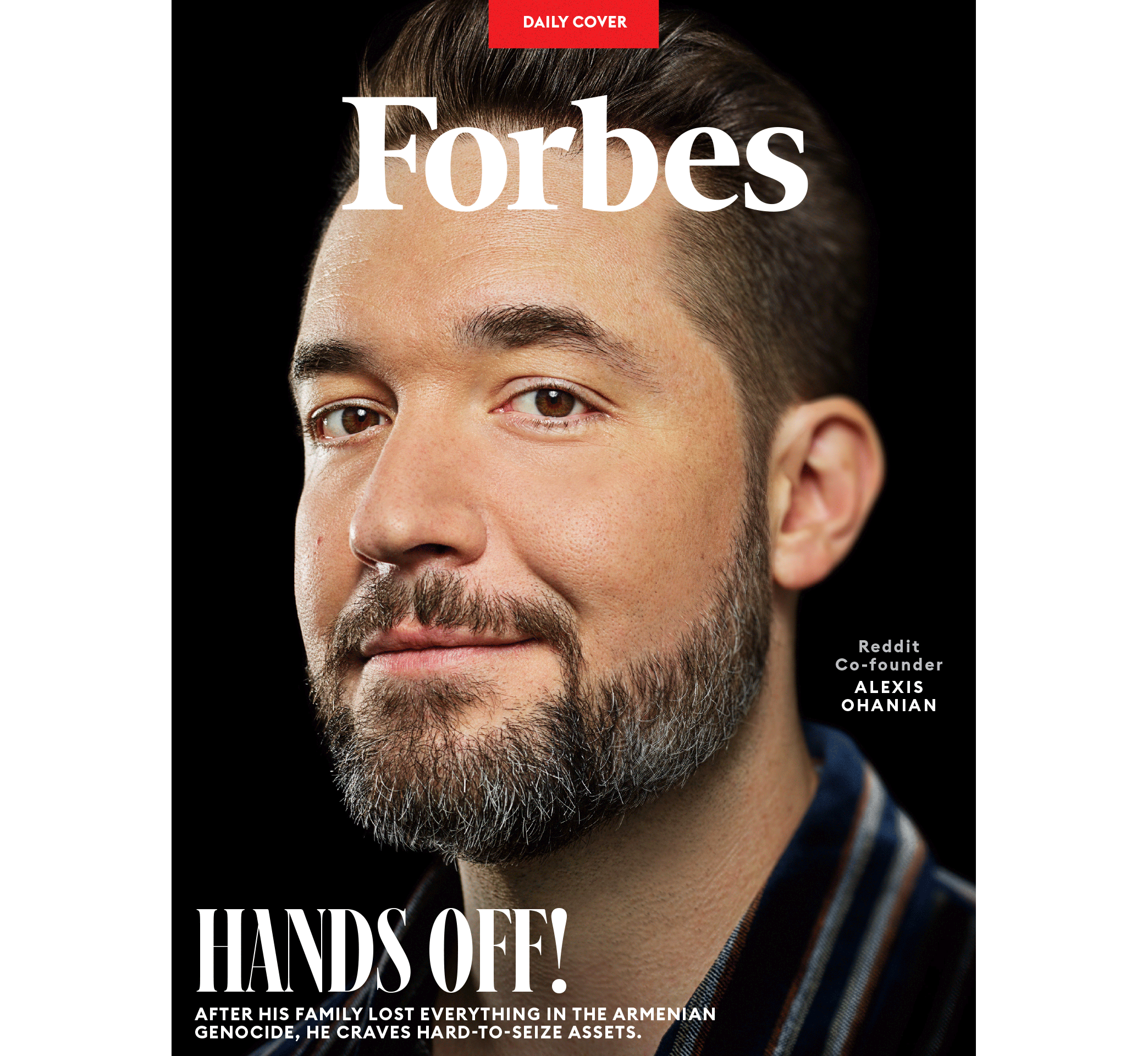‘Here to stay’: Reddit co-founder’s bold prediction
Mục lục bài viết
Alexis Ohanian’s ancestors perished during the Armenian genocide and had their assets seized. That generational trauma is a big reason why he’s betting heavily on NFTs and future social networks, despite crypto’s chilly winter storm.
 Reddit co-founder Alexis Ohanian unwinds at his farm in Jupiter, Florida, in front of sculptural elements designed by his wife, Serena Williams. [-] GUERIN BLASK FOR FORBES
Reddit co-founder Alexis Ohanian unwinds at his farm in Jupiter, Florida, in front of sculptural elements designed by his wife, Serena Williams. [-] GUERIN BLASK FOR FORBES
Among Alexis Ohanian’s earliest memories is his great aunt Vera, sitting him down on his sixth birthday to tell him in graphic detail about how his great-great-aunt and uncle were killed while being marched through the Syrian desert during the Armenian genocide more than a century ago; how as a child his great-grandfather, Avedis, saw his parents decapitated by Turkish soldiers, who upon turning their attention to the youngster were barely stopped by another soldier on horseback; how that little boy was then shipped off to an orphanage in Istanbul before making his way to Ellis Island.
“A lot of people sacrificed for that opportunity,” she told him. “You have to make the most of it.”
Sitting in the living room of his $1.8 million farmhouse man cave, complete with chickens and a life-size statue of Ironman, around the corner from the palatial mansion he owns with his wife, tennis star Serena Williams in Jupiter, Florida, Reddit co-founder Ohanian somberly sips his coffee. Reflecting on the events of the genocide of 1915, when an estimated 1.5 million people were killed, Ohanian gestures to the three newly acquired Armenian rugs on floor around him, explaining how his family’s inheritance of heirloom rugs was seized by Turkish soldiers.
“Any group of people who have in their consciousness, or in their collective history, some idea of persecution, especially by a state, makes the idea of a store of value that is not controlled by any single state very attractive,” says Ohanian. “And so, in some ways it was hardwired in me then, and made me in a way receptive to the idea of a decentralized currency.”
That insight has been profitable. Cashing in on part of his $50 million in proceeds from early Coinbase and ether investments to help pay for his wife’s 17-carat diamond engagement ring, Ohanian has turned his affinity for decentralized currency and other digital assets into his main job. He has invested in 29 startups using cryptocurrency’s underlying blockchain technology and in February 2022 raised $500 million, largely to finance more such companies. Ohanian calls himself a “crypto pragmatist,” supporting U.S. regulation while simultaneously managing the passwords known as private keys for some of his most prized assets, a practice called self-custody and a crucial step for ensuring at least some of his personal holdings remain out of reach of the government–or anybody else.

Guerin Blask for Forbes
In the aftermath of the collapse of FTX, which stranded billions of dollars of customers’ digital assets on the exchange, his optimism about crypto’s future was tested. A $176 million fund Ohanian was on the verge of raising in August 2022 evaporated. Thanks largely to the collapse of FTX, which had been the world’s second-largest crypto exchange, an estimated $2.8 billion of bitcoin flowed off centralized rivals over the course of a single month as crypto enthusiasts rushed toward self-custody, protecting their assets from being trapped on third- party platforms and making them nearly impossible to seize. While the collapse left many an embittered investor swearing off crypto forever, Ohanian’s family history steeled him to double down on his commitment to invest.
“Even if all this experiment produces is a mechanism that enough people believe in to be able to take some notion of ownership or value–as subjective as that might be–from one place to another, that is unfettered, that feels like a win,” says Ohanian. “And even though it is extremely volatile, there are plenty of people who have that generational consciousness of seeing massive inflation. So many countries in Latin America, plenty of countries throughout the world have this notion of it. And so when they see the volatility of cryptocurrency, it’s like, ‘Okay, yeah, it’s volatile, but have you seen the shit we’ve lived through?’”
Born in 1983 in Brooklyn, Ohanian learned his first business lessons collecting and trading Panini-branded NFL trading cards with his father. “I’d see a card worth $4 and I was like, ‘Oh my god, I just made a ton of money,’” says Ohanian of the occasional future hall of famer or rookie card in packs he bought for $4 each. Unfortunately, he wasn’t the only one thinking that, and an explosion of sports cards printed to meet the demand during the 1990s left him with boxes of little more than printed cardboard. “I hadn’t thought through the fact that if there are a million of these cards, that devalues the supply.”
By ninth grade his passion turned to first-person shooter video games like Quake 2. Every Tuesday night, he asked his parents to excuse him from dinner, and he left to join other players online in the game. His family had no idea what he was up to. “They just knew I got up from dinner really abruptly because I had to go do something on the computer,” he says. “It was a deep enough connection that I felt like I knew these people.”
In 2005, that sense of connection informed his approach to co-founding Reddit, a social network composed of quasi-anonymous users joining special-interest communities called subreddits. “People can and will care more about pseudonymous people on the internet than the people they might see every day,” he says. Reddit prospered, and in October 2006, just a year after graduating from University of Virginia, Ohanian sold the social network to publishing giant Conde Nast for $10 million. That was “a sale price for 16 months worth of work that was going to be more money than my parents were going to make their entire lives,” he says—though in light of subsequent social network valuations, it is a price he came to regret.
By 2010, Ohanian quit Conde and flew to Armenia for the first time. While volunteering at the Yerevan offices of San Francisco microfinance firm Kiva, Ohanian reconnected with his father’s roots and learned more about his paternal homeland. “What I wanted to be able to do is start to build these relationships,” he says.
Around this time, members of the newly launched bitcoin subreddit introduced him to a new kind of asset, one that was potentially unseizable. Unlike dollars that move through regulated financial institutions that can be compelled by governments to hand over property, bitcoin relies on a public key that anyone can know, and a private key that proves ownership. No bank or other intermediary needed. Ironically, safely storing one’s own private key is difficult, forcing many users back to third parties that do it for them, and reintroducing the potential that assets can be seized.

Guerin Blask for Forbes
The biggest risk at the time though, wasn’t government seizure, but bad security. In the aftermath of the $500 million hack of the Mt. Gox bitcoin exchange in 2014, many cryptocurrency owners were looking for a safer third party to hold those assets. Garry Tan, the co-founder of Ohanian’s newly launched venture-capital firm Initialized, introduced him to Coinbase, a crypto exchange dedicated to regulatory compliance co-created by a former Goldman Sachs foreign-exchange trader, Fred Erhsam, and former Airbnb product manager Brian Armstrong.
In one of Ohanian’s first meetings with Coinbase, he heard about a soon-to-be launched cryptocurrency called ether. With theoretically unseizable properties similar to bitcoin and a computer language for building complex financial instruments, Ohanian saw ether’s underlying blockchain, called Ethereum, as a tool for developers to create a wide variety of potentially unseizable assets, including non-fungible tokens (NFTs) that can represent any unique digital property, from photographs to deeds to homes. That summer he invested $15,000 to buy about 50,000 ether, now worth about $84 million. “In hindsight, I didn’t invest nearly as much as I should have,” says Ohanian.
‘How do you spell it?
It is rare however, that anyone actually gets to act on hindsight. That chance came to Ohanian in the winter of 2014, when he was asked to return to Reddit as executive chairman. In spite of the fact that Reddit users had ballooned from 13.7 million unique visitors to 174 million around the time he left, the company still didn’t have a mobile app.
In 2015, when Ohanian first met Serena Williams over truffle omelets at the Waldorf Astoria in Rome, that strategic omission almost cost him a second date.
“I was like, I haven’t heard of it. And there’s no app? It mustn’t be real.”
Serena Williams
“She asked me what I did. I said I started and run this company called Reddit. She pretended like she knew of it, but she didn’t.
She goes to her phone and searches the app store and she’s like ‘how do you spell it?’ and I’m like ‘R-E-D-D-I-T.’ I’m sweating because I have to try to explain to her we don’t have an app,” says Ohanian, with pictures from their wedding hanging on the wall behind him. Laughing, Williams recalls: “I was like, I haven’t heard of it. And there’s no app? It mustn’t be real.” Fortunately for him, it didn’t take her long to learn otherwise.
 Serena Williams (CL) and husband Alexis Ohanian (CR) arrive at Prince Harry and Meghan’s wedding. Image: Getty
Serena Williams (CL) and husband Alexis Ohanian (CR) arrive at Prince Harry and Meghan’s wedding. Image: Getty
In April 2016 Reddit finally launched its app, and by December 2019 it had grown to 430 million users. Six months later, Ohanian abruptly resigned, for the second time, over disputes with how to handle content many found offensive. He requested he be replaced by a Black board member. “The business was a billion-dollar business,” he says. “But none of the monetary value accrued to the users.” Later that month he left his venture firm Initialized as well to focus on investing in early-stage startups, especially those using blockchain to re-imagine social networks. One former employee at Reddit called him a cloud-chaser.
In September 2020, Ohanian filed paperwork for the first fund of his Florida-based venture firm, dubbed 776 after the year of the first Olympics in 776 B.C. The new firm was financed with $26 million from the Coinbase stock he received when the exchange went public, with another million dollars going to former NFL star Colin Kaepernick’s non-profit Know Your Rights Camp. Nearly half of 776’s portfolio is dedicated to blockchain startups focused on social networks where the value created accrues to its users in a variety of ways. On the most basic level, this includes NFTs that serve as membership cards valued and traded on the free market, giving access to online and real world events.
“We’ve never seen what’s possible, having a very motivated and aligned community of this kind of size from day one,” says Ohanian.
If there is a digital asset Ohanian favors, it is non-fungible tokens or NFTs. He personally owns no fewer than 700 NFTs stored on a third-party site, giving him early access to organizations like Los Angeles-based Islands, a company 776 also owns that is building its own metaverse. Ohanian also owns NFTs that give him ownership rights to real estate in Georgia; and to the Ethereum Naming Service, a registry for domains that would work under a decentralized version of the internet known as Web3. Ohanian also owns NFTs stored elsewhere, and many that are self-custodied.
NFTs are similar to bitcoin and other cryptocurrencies whose prices can react to activity on the blockchain or to concerns over regulation, for example. But because each NFT is different–unlike fungible currency tokens–their histories, or provenance, impact individual valuations. That creates opportunities for owners who can capitalize on their own public images. In August 2021, Ohanian spent $550,000 worth of ether at today’s prices on seven NFTs that he thought looked like his famous spouse. He gave his favorite one to her (that wallet now contains 66 NFTs) and wore a pin version of it to the Metropolitan Museum of Art’s annual Gala in New York, generating free publicity in the form of news articles about the event. “Now we’ve put it into the culture,” he says, and likely increased its value if they ever wanted to sell it—or bequeath it to a relative.
What’s true for the power couple, is even more so for Ohanian’s 776. Ohanian says all of his future NFT investments will be conducted through the fund. In April 2022, 776 joined the likes of Menlo Park, California-based Andreessen Horowitz and San Francisco-based Paradigm, when it was granted a license by the SEC as a registered investment advisor (RIA), meaning it will likely hold more, riskier assets in exchange for increased transparency and regulatory oversight. When 776 invested $10 million into Digg founder Kevin Rose’s new NFT startup Proof, it also bought a basket of NFTs created by the firm. “The NFTs let us increase the surface area of what we can invest in,” says Ohanian referring to the great potential of these tokens as unique branded entities. That plan started to take shape in August, when 776 licensed a Bored Ape NFT it owned called Pete to an animation studio.
While privacy is fine if you’re an individual investor, it doesn’t work the same for registered investment advisors.
Promptly after receiving the RIA license, 776 set about raising a $176 million crypto fund that dwindled to just $6 million as the digital-asset sector was engulfed by its crypto winter. “I got that timing wrong,” he says. Instead, 30% of a planned $776 million capital raise expected to be announced later this year will be set aside to invest in Web3 startups, The Information reported, citing investor documents. Though Ohanian declined to share details on how the bulk of his portfolio has performed, it’s hard to see how 776 could have escaped the digital asset market’s recent collapse. Following the overall NFT market–whose monthly volume has collapsed 83% since its all-time high last January, according to data site CryptoSlam– trading of Bored Ape Yacht Club NFTs, the flagship of portfolio company Yuga Labs has dropped 88% from its record; Doodles NFT activity is down 85%; and Moonbirds, created by Proof, is off 98%. Making matters worse, half of the $200 million Ohanian had earmarked to invest in blockchain social networks was for companies building on Solana, the favorite of bankrupt FTX’s former CEO Sam Bankman-Fried. Solana’s sol token was valued at $258 when the allocation was announced, now it trades at about $25.
While privacy is fine if you’re an individual investor, it doesn’t work the same for registered investment advisors. To comply with regulatory requirements, 776 stores its digital assets at two separate regulated third-party custodians that can be compelled to hand over or freeze assets. Same goes for at least one of 776’s limited partnership holdings, according to Ryan Akkina, of MIT’s Investment Management Co., which stores its digital assets with a third-party custodian bank.
Once assets are under control of third parties—especially those willing to comply with government demands—the investments are no longer immune to seizure. Though none of the $68 billion in asset seizures tracked by the non-profit Institute for Justice between 2000 and 2019 were crypto, the Immigration Customs and Enforcement office seized $3.98 billion worth of cryptocurrency in 2022 alone. Leslie Sammis, a Tampa-based lawyer who specializes in criminal defense, says that cryptocurrency seizures have increased from none of her business in 2021 to 20% in 2022—all of them from centralized exchanges.
“It’s the innocent people that get screwed the most,” warns Sammis, referring to clients she claims get caught in the cross-hairs of some government seizures. “The people that are drug dealers or whatever, they know a little bit more about it.” However, Timothy Massad, former chairman of the Commodities Futures Trading Commission and current digital assets fellow at Harvard, says that without the ability to seize assets, many stolen items would never be returned to their lawful owners. “I don’t think criminal law enforcement is inconsistent with the notion of a free market,” Massad says.
During Ohanian’s most recent trip to Armenia he engaged in what he calls “family mode.” In addition to preparing an inheritance of NFTs for his daughter, Olympia, he bought the three Armenian rugs that are now on display at his farm, hoping to rebuild the legacy that was seized more than a century ago. “I was thinking, Okay, how do I help restore some of these physical connections that were broken?” Once again gesturing to the floor around him he adds: “And so these carpets are all for Olympia. And who knows any other kids we might have. Knock on wood, this is not a country I’m planning on fleeing. But I know not everyone has that opportunity.”
This article was first published on forbes.com All figures are in US dollars.











